Module 5 Lao She's Teahouse.Unit 3 Language in use 课件(28张PPT)
文档属性
| 名称 | Module 5 Lao She's Teahouse.Unit 3 Language in use 课件(28张PPT) |
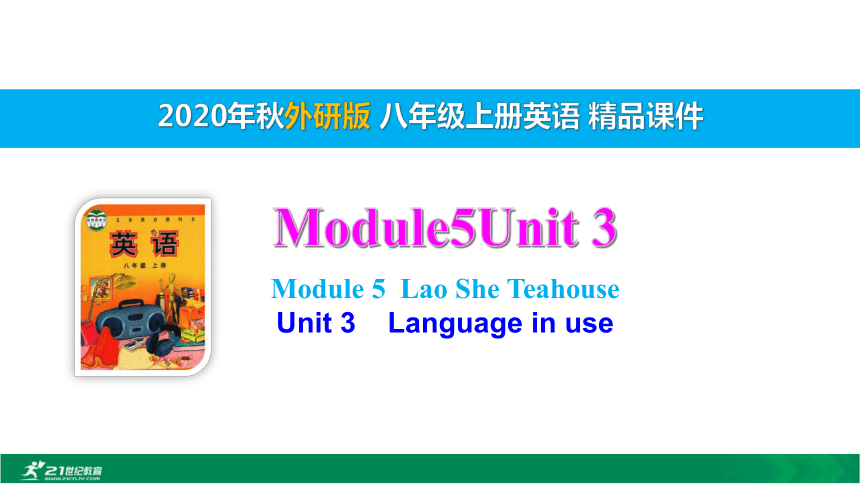
|
|
| 格式 | pptx | ||
| 文件大小 | 4.2MB | ||
| 资源类型 | 试卷 | ||
| 版本资源 | 外研版 | ||
| 科目 | 英语 | ||
| 更新时间 | 2020-08-12 00:00:00 | ||
图片预览

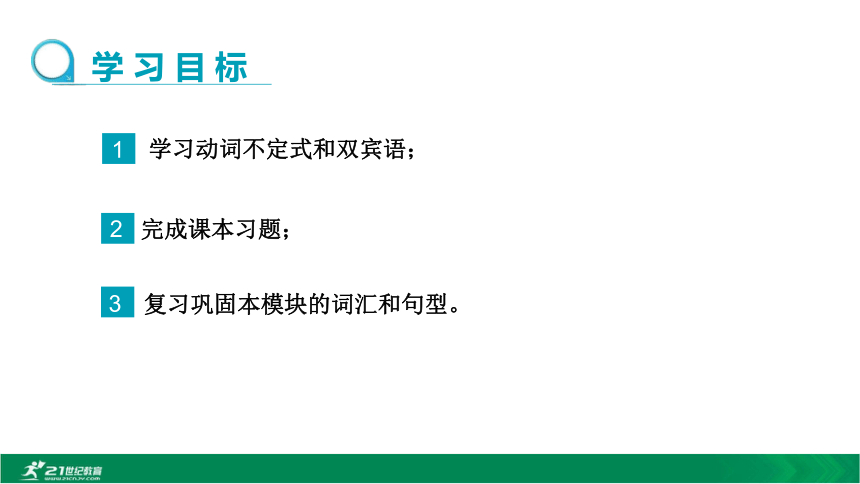

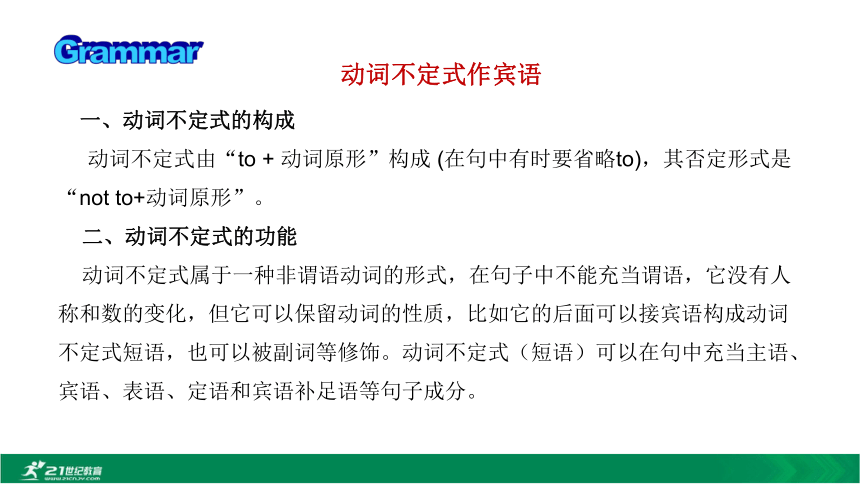
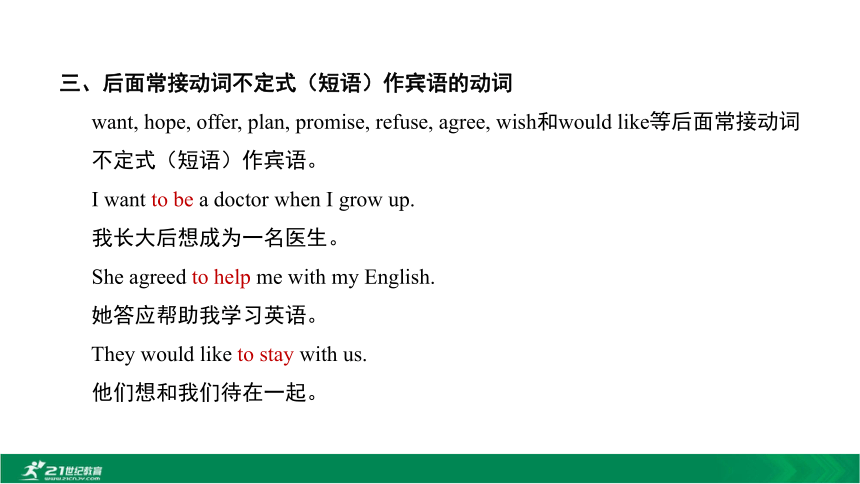
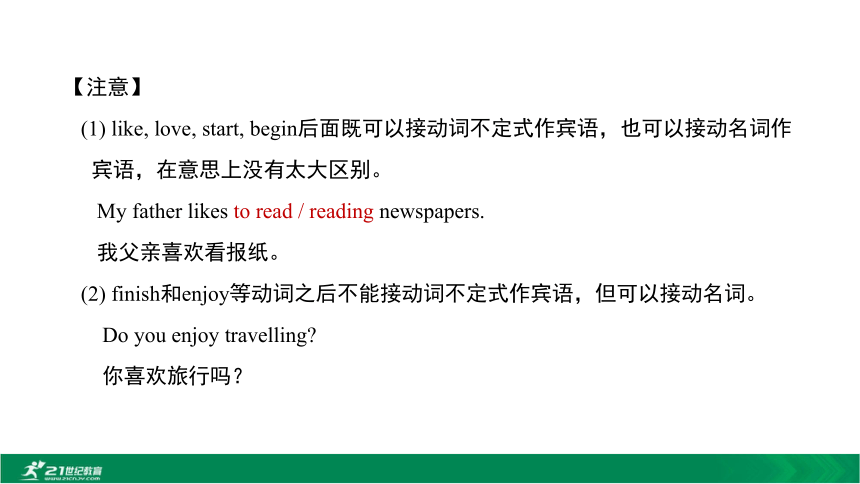
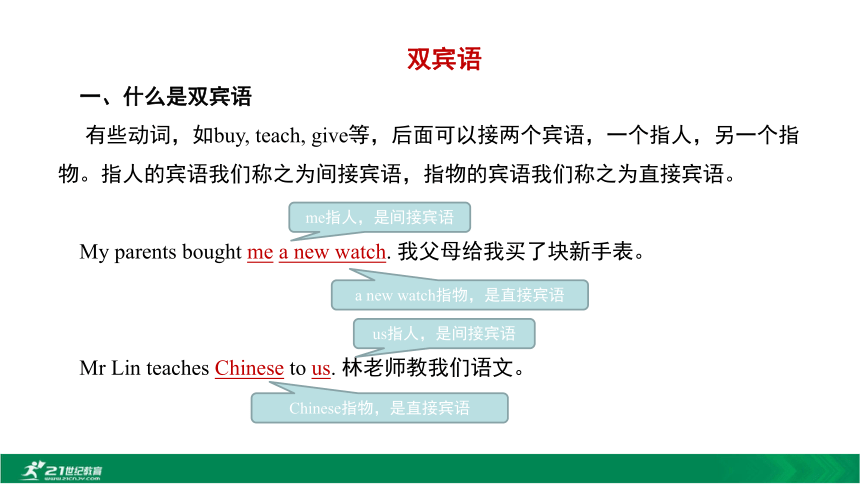
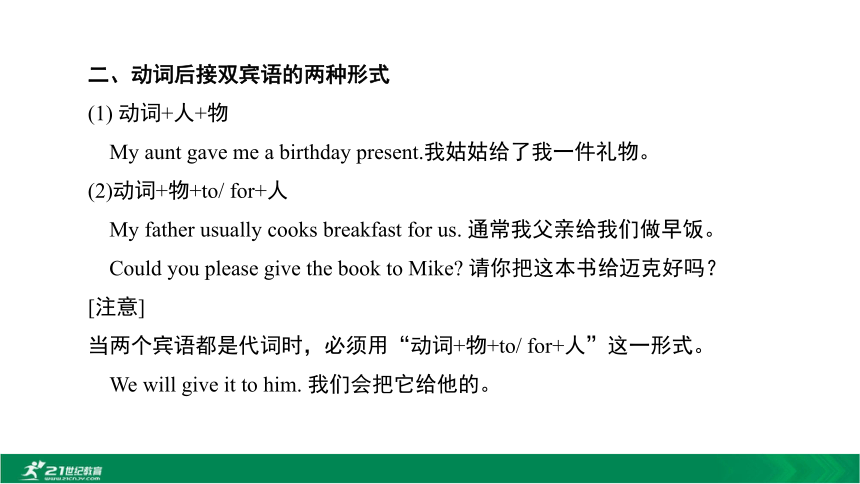
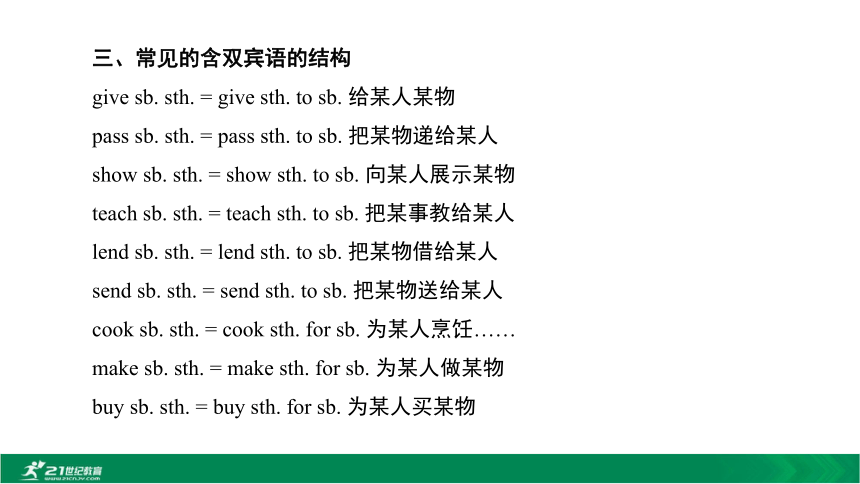
文档简介
2020年秋外研版 八年级上册英语 精品课件
Module5Unit 3
Module 5 Lao She Teahouse
Unit 3 Language in use
学 习 目 标
学习动词不定式和双宾语;
1
3
复习巩固本模块的词汇和句型。
完成课本习题;
2
课 堂 学 习
Language practice
I wanted to see the Beijing Opera.
Lingling offered to take me there.
We only planned to watch for an hour.
I hope to understand more next time.
动词不定式作宾语
一、动词不定式的构成
动词不定式由“to + 动词原形”构成 (在句中有时要省略to),其否定形式是“not to+动词原形”。
二、动词不定式的功能
动词不定式属于一种非谓语动词的形式,在句子中不能充当谓语,它没有人称和数的变化,但它可以保留动词的性质,比如它的后面可以接宾语构成动词不定式短语,也可以被副词等修饰。动词不定式(短语)可以在句中充当主语、宾语、表语、定语和宾语补足语等句子成分。
Grammar
三、后面常接动词不定式(短语)作宾语的动词
want, hope, offer, plan, promise, refuse, agree, wish和would like等后面常接动词不定式(短语)作宾语。
I want to be a doctor when I grow up.
我长大后想成为一名医生。
She agreed to help me with my English.
她答应帮助我学习英语。
They would like to stay with us.
他们想和我们待在一起。
【注意】
(1) like, love, start, begin后面既可以接动词不定式作宾语,也可以接动名词作宾语,在意思上没有太大区别。
My father likes to read / reading newspapers.
我父亲喜欢看报纸。
(2) finish和enjoy等动词之后不能接动词不定式作宾语,但可以接动名词。
Do you enjoy travelling?
你喜欢旅行吗?
双宾语
一、什么是双宾语
有些动词,如buy, teach, give等,后面可以接两个宾语,一个指人,另一个指物。指人的宾语我们称之为间接宾语,指物的宾语我们称之为直接宾语。
My parents bought me a new watch. 我父母给我买了块新手表。
Mr Lin teaches Chinese to us. 林老师教我们语文。
me指人,是间接宾语
a new watch指物,是直接宾语
us指人,是间接宾语
Chinese指物,是直接宾语
二、动词后接双宾语的两种形式
(1) 动词+人+物
My aunt gave me a birthday present.我姑姑给了我一件礼物。
(2)动词+物+to/ for+人
My father usually cooks breakfast for us. 通常我父亲给我们做早饭。
Could you please give the book to Mike? 请你把这本书给迈克好吗?
[注意]
当两个宾语都是代词时,必须用“动词+物+to/ for+人”这一形式。
We will give it to him. 我们会把它给他的。
三、常见的含双宾语的结构
give sb. sth. = give sth. to sb. 给某人某物
pass sb. sth. = pass sth. to sb. 把某物递给某人
show sb. sth. = show sth. to sb. 向某人展示某物
teach sb. sth. = teach sth. to sb. 把某事教给某人
lend sb. sth. = lend sth. to sb. 把某物借给某人
send sb. sth. = send sth. to sb. 把某物送给某人
cook sb. sth. = cook sth. for sb. 为某人烹饪……
make sb. sth. = make sth. for sb. 为某人做某物
buy sb. sth. = buy sth. for sb. 为某人买某物
1 Complete the sentences with the correct form of the words
in the box.
Do you want to go the teahouse?
1 We decided ________ at home because it was raining.
2 Lao She started________ Chinese in London in 1924.
3 I tried_________ poems.
4 They plan_______ a film tomorrow.
5 I want_________ my holiday in Beijing.
to stay
to teach
to write
to see
to spend
see spend stay teach write
Practice
2 Read the conversation and complete the note with the
correct form of the words in the box.
Betty: I’d love to see the Beijing Opera again.
Lingling: Would you like me to take you? Where can we go this time?
Daming: I know! You can go to Mei Lanfang Theatre.
Lingling: Good idea! Let’s go next Saturday, Betty.
advise decide offer want
Betty (1) _______ to see the Beijing Opera again. Lingling
(2) ________ to take her. Daming (3) ________ them to go to Mei Lanfang Theatre. Lingling (4) ________ to go next Saturday.
wanted
offered
advised
decided
Lu Xun is one of the greatest writers of modern China. He was born in Shaoxing, Zhejiang Province, in 1881. At first, Lu Xun hoped (1) __________ (help) the Chinese people become healthy and strong, so he decided (2) _______ (be) a doctor. After a few years, he started (3) _________ (write) short stories because he wanted (4) ________ (teach) people about society. One of his most famous stories is The True Story of Ah Q. It describes the hard life of Ah Q and makes people (5) ______ (think) about society. In the 1920s, people began to translate his works into English.
3 Complete the passage with the correct form of the words
in brackets.
to help
to be
to write
to teach
think
We went to the (1) ________ last night to see a play. I had a (2) __________ evening. The play was very good and all the actors were excellent. The story (3) __________ in a small village in China. It was all about an old box of gold! The box was a (4) _______ box and was difficult to open. The play was very interesting, and everyone (5) _________ at the end of the play!
4 Complete the passage with the correct form of the words
and expression in the box.
theatre
wonderful
took place
magic
cheered
cheer magic take place theatre wonderful
1 Who is visiting London?
a) Vicky. b) Steve. c) Romeo.
2 What are they talking about?
a) Romeo and Juliet.
b) London.
c) Vicky’s parents.
5 Listen and choose the correct answer.
6 Listen again and check (√) the true sentences.
1 Steve went to Shakespeare’s Globe Theatre last night.
2 Vicky offered to take Steve to the theatre.
3 Steve did not try to understand the words.
4 Vicky hopes to see her favourite play.
5 Vicky thinks her parents will take her to the theatre.
√
√
√
Tapescript:
Vicky: Hello, Steve. Are you enjoying your visit to London?
Steve: Thank you for asking, Vicky. I’m having a great time. We went to Shakepear's Globe Theatre last night.
Vicky: Oh yes, it’s great. A lot of tourists want to go there.
Steve: Yes, my uncle offered to take us, and we decided to see Romeo and Juliet.
Vicky: Did you understand the play?
Steve: Well, I tried to understand the words. It was very difficult. But I knew the story.
Vicky: I hope to see Romeo and Juliet too. It’s my favourite play.
Steve: Will your parents agree to take you?
Vicky: Yes, I’m sure they will.
--- I want to see the Beijing Opera.
--- Why don’t we…?
7 Work in pairs. Talk about your weekend plans. Use the words and expressions in the box to help you.
hope how about let’s want why don’t we why not would like
8 Read the passage and choose the correct answer.
1 You would find the passage in _______.
a) a book b) a school newspaper c) a magazine
2 The writer ______.
a) liked the play
b) did not like the play
c) did not say he liked the play or not
3. The actors and actresses in the play wore _____.
a) the same clothes as today
b) their best clothes
c) clothes of the first half of the twentieth century
4. Li Nan is ______.
a) a famous actor b) a student c) an actress
b
a
c
b
Theatres
Western theatre started in Greece, around 600 BC. The theatres were very big. About 15,000 people could watch a play at the same time. The audience sat on stone seats to watch the performances. Some of the theatres survive, as do some of the plays by ancient Greek writers. People still watch these plays today.
Around the world
大约,相当于about
9 Work in groups. Find a play. Think about these questions.
Module task: Acting out a scene from a play
1 Where does it take place?
Who is in it?
What is the story?
4 What are the special moments in it?
10 Choose a scene and practise it.
11 Act out the scene in front of the class.
1. --- What are you going to do tonight?
--- I plan ______ Days of Our Past.
A. watch B. watching C. to watch D. watched
2. --- Sam, don’t forget ______ the book to the library tomorrow?
--- OK, I won’t.
A. return B. returning C. returned D. to return
3. Mr Smith will teach ______ English this term.
A. we B. us C. our D. ourselves
4. Miss Gao told the good news ______ every student in the class.
A. for B. with C. to D. about
Ⅰ.单项填空
C
课 堂 达 标
B
D
C
1. My mother hoped ____________ (relax) on the beach.
2. His grandmother was old. She didn’t know how ____________ (use) the washing machine.
3. Mum, I am hungry. Could you please cook _______ (I) some noodles?
4. Sally learnt __________ (play) the piano at the age of three.
5. Tony and I want ____________ (try) a new restaurant near my home.
6. In the end, Mary chose ____________ (drive) to the airport.
to relax
Ⅱ.用所给单词的适当形式填空
to use
me
to play
to try
to drive
1. Go over what you’ve learnt in Unit 3.
2. Preview the new words and expressions
in Module 6.
Homework
谢谢
21世纪教育网(www.21cnjy.com) 中小学教育资源网站
有大把高质量资料?一线教师?一线教研员?
欢迎加入21世纪教育网教师合作团队!!月薪过万不是梦!!
详情请看:
https://www.21cnjy.com/help/help_extract.php
Module5Unit 3
Module 5 Lao She Teahouse
Unit 3 Language in use
学 习 目 标
学习动词不定式和双宾语;
1
3
复习巩固本模块的词汇和句型。
完成课本习题;
2
课 堂 学 习
Language practice
I wanted to see the Beijing Opera.
Lingling offered to take me there.
We only planned to watch for an hour.
I hope to understand more next time.
动词不定式作宾语
一、动词不定式的构成
动词不定式由“to + 动词原形”构成 (在句中有时要省略to),其否定形式是“not to+动词原形”。
二、动词不定式的功能
动词不定式属于一种非谓语动词的形式,在句子中不能充当谓语,它没有人称和数的变化,但它可以保留动词的性质,比如它的后面可以接宾语构成动词不定式短语,也可以被副词等修饰。动词不定式(短语)可以在句中充当主语、宾语、表语、定语和宾语补足语等句子成分。
Grammar
三、后面常接动词不定式(短语)作宾语的动词
want, hope, offer, plan, promise, refuse, agree, wish和would like等后面常接动词不定式(短语)作宾语。
I want to be a doctor when I grow up.
我长大后想成为一名医生。
She agreed to help me with my English.
她答应帮助我学习英语。
They would like to stay with us.
他们想和我们待在一起。
【注意】
(1) like, love, start, begin后面既可以接动词不定式作宾语,也可以接动名词作宾语,在意思上没有太大区别。
My father likes to read / reading newspapers.
我父亲喜欢看报纸。
(2) finish和enjoy等动词之后不能接动词不定式作宾语,但可以接动名词。
Do you enjoy travelling?
你喜欢旅行吗?
双宾语
一、什么是双宾语
有些动词,如buy, teach, give等,后面可以接两个宾语,一个指人,另一个指物。指人的宾语我们称之为间接宾语,指物的宾语我们称之为直接宾语。
My parents bought me a new watch. 我父母给我买了块新手表。
Mr Lin teaches Chinese to us. 林老师教我们语文。
me指人,是间接宾语
a new watch指物,是直接宾语
us指人,是间接宾语
Chinese指物,是直接宾语
二、动词后接双宾语的两种形式
(1) 动词+人+物
My aunt gave me a birthday present.我姑姑给了我一件礼物。
(2)动词+物+to/ for+人
My father usually cooks breakfast for us. 通常我父亲给我们做早饭。
Could you please give the book to Mike? 请你把这本书给迈克好吗?
[注意]
当两个宾语都是代词时,必须用“动词+物+to/ for+人”这一形式。
We will give it to him. 我们会把它给他的。
三、常见的含双宾语的结构
give sb. sth. = give sth. to sb. 给某人某物
pass sb. sth. = pass sth. to sb. 把某物递给某人
show sb. sth. = show sth. to sb. 向某人展示某物
teach sb. sth. = teach sth. to sb. 把某事教给某人
lend sb. sth. = lend sth. to sb. 把某物借给某人
send sb. sth. = send sth. to sb. 把某物送给某人
cook sb. sth. = cook sth. for sb. 为某人烹饪……
make sb. sth. = make sth. for sb. 为某人做某物
buy sb. sth. = buy sth. for sb. 为某人买某物
1 Complete the sentences with the correct form of the words
in the box.
Do you want to go the teahouse?
1 We decided ________ at home because it was raining.
2 Lao She started________ Chinese in London in 1924.
3 I tried_________ poems.
4 They plan_______ a film tomorrow.
5 I want_________ my holiday in Beijing.
to stay
to teach
to write
to see
to spend
see spend stay teach write
Practice
2 Read the conversation and complete the note with the
correct form of the words in the box.
Betty: I’d love to see the Beijing Opera again.
Lingling: Would you like me to take you? Where can we go this time?
Daming: I know! You can go to Mei Lanfang Theatre.
Lingling: Good idea! Let’s go next Saturday, Betty.
advise decide offer want
Betty (1) _______ to see the Beijing Opera again. Lingling
(2) ________ to take her. Daming (3) ________ them to go to Mei Lanfang Theatre. Lingling (4) ________ to go next Saturday.
wanted
offered
advised
decided
Lu Xun is one of the greatest writers of modern China. He was born in Shaoxing, Zhejiang Province, in 1881. At first, Lu Xun hoped (1) __________ (help) the Chinese people become healthy and strong, so he decided (2) _______ (be) a doctor. After a few years, he started (3) _________ (write) short stories because he wanted (4) ________ (teach) people about society. One of his most famous stories is The True Story of Ah Q. It describes the hard life of Ah Q and makes people (5) ______ (think) about society. In the 1920s, people began to translate his works into English.
3 Complete the passage with the correct form of the words
in brackets.
to help
to be
to write
to teach
think
We went to the (1) ________ last night to see a play. I had a (2) __________ evening. The play was very good and all the actors were excellent. The story (3) __________ in a small village in China. It was all about an old box of gold! The box was a (4) _______ box and was difficult to open. The play was very interesting, and everyone (5) _________ at the end of the play!
4 Complete the passage with the correct form of the words
and expression in the box.
theatre
wonderful
took place
magic
cheered
cheer magic take place theatre wonderful
1 Who is visiting London?
a) Vicky. b) Steve. c) Romeo.
2 What are they talking about?
a) Romeo and Juliet.
b) London.
c) Vicky’s parents.
5 Listen and choose the correct answer.
6 Listen again and check (√) the true sentences.
1 Steve went to Shakespeare’s Globe Theatre last night.
2 Vicky offered to take Steve to the theatre.
3 Steve did not try to understand the words.
4 Vicky hopes to see her favourite play.
5 Vicky thinks her parents will take her to the theatre.
√
√
√
Tapescript:
Vicky: Hello, Steve. Are you enjoying your visit to London?
Steve: Thank you for asking, Vicky. I’m having a great time. We went to Shakepear's Globe Theatre last night.
Vicky: Oh yes, it’s great. A lot of tourists want to go there.
Steve: Yes, my uncle offered to take us, and we decided to see Romeo and Juliet.
Vicky: Did you understand the play?
Steve: Well, I tried to understand the words. It was very difficult. But I knew the story.
Vicky: I hope to see Romeo and Juliet too. It’s my favourite play.
Steve: Will your parents agree to take you?
Vicky: Yes, I’m sure they will.
--- I want to see the Beijing Opera.
--- Why don’t we…?
7 Work in pairs. Talk about your weekend plans. Use the words and expressions in the box to help you.
hope how about let’s want why don’t we why not would like
8 Read the passage and choose the correct answer.
1 You would find the passage in _______.
a) a book b) a school newspaper c) a magazine
2 The writer ______.
a) liked the play
b) did not like the play
c) did not say he liked the play or not
3. The actors and actresses in the play wore _____.
a) the same clothes as today
b) their best clothes
c) clothes of the first half of the twentieth century
4. Li Nan is ______.
a) a famous actor b) a student c) an actress
b
a
c
b
Theatres
Western theatre started in Greece, around 600 BC. The theatres were very big. About 15,000 people could watch a play at the same time. The audience sat on stone seats to watch the performances. Some of the theatres survive, as do some of the plays by ancient Greek writers. People still watch these plays today.
Around the world
大约,相当于about
9 Work in groups. Find a play. Think about these questions.
Module task: Acting out a scene from a play
1 Where does it take place?
Who is in it?
What is the story?
4 What are the special moments in it?
10 Choose a scene and practise it.
11 Act out the scene in front of the class.
1. --- What are you going to do tonight?
--- I plan ______ Days of Our Past.
A. watch B. watching C. to watch D. watched
2. --- Sam, don’t forget ______ the book to the library tomorrow?
--- OK, I won’t.
A. return B. returning C. returned D. to return
3. Mr Smith will teach ______ English this term.
A. we B. us C. our D. ourselves
4. Miss Gao told the good news ______ every student in the class.
A. for B. with C. to D. about
Ⅰ.单项填空
C
课 堂 达 标
B
D
C
1. My mother hoped ____________ (relax) on the beach.
2. His grandmother was old. She didn’t know how ____________ (use) the washing machine.
3. Mum, I am hungry. Could you please cook _______ (I) some noodles?
4. Sally learnt __________ (play) the piano at the age of three.
5. Tony and I want ____________ (try) a new restaurant near my home.
6. In the end, Mary chose ____________ (drive) to the airport.
to relax
Ⅱ.用所给单词的适当形式填空
to use
me
to play
to try
to drive
1. Go over what you’ve learnt in Unit 3.
2. Preview the new words and expressions
in Module 6.
Homework
谢谢
21世纪教育网(www.21cnjy.com) 中小学教育资源网站
有大把高质量资料?一线教师?一线教研员?
欢迎加入21世纪教育网教师合作团队!!月薪过万不是梦!!
详情请看:
https://www.21cnjy.com/help/help_extract.php
同课章节目录
- Module 1 How to learn English
- Unit 1 Let's try to speak English as much as possi
- Unit 2 You should smile at her.
- Unit 3 Language in use .
- Module 2 My home town and my country
- Unit 1 It's taller than many other buildings.
- Unit 2 Cambridge is a beautiful city in the east o
- Unit 3 Language in use .
- Module 3 Sports.
- Unit 1 Nothing is more exciting than playing tenni
- Unit 2 This year we training more carefully.
- Unit 3 Language in use .
- Module 4 Planes, ships and trains .
- Unit 1 He lives the farthest from school.
- Unit 2 What is the best way to travel.
- Unit 3 Language in use .
- Module 5 Lao She Teahouse.
- Unit 1 I wanted to see the Beijing Opera.
- Unit 2 It descibes the changes in Chinese society.
- Unit 3 Language in use .
- Module 6 Animals in danger.
- Unit 1 It allows people to get closer to them .
- Unit 2 The WWF is working hard to save them all.
- Unit 3 Language in use .
- Revision module A
- Module 7 A famous story
- Unit 1 Alice was sitting with her sister by the ri
- Unit 2 She was thinking about her cat.
- Unit 3 Language in use .
- Module 8 Accidents
- Unit 1 While the car were changing to red, a car s
- Unit 2 I was trying to pick it up when it bite me
- Unit 3 Language in use .
- Module 9 Population
- Unit 1 The population of China is about 1.37 billi
- Unit 2 Arnwick was a city with 200,000 people.
- Unit 3 Language in use .
- Module 10 The weathe
- Unit 1 It might snow.
- Unit 2 The weather is fine all year round.
- Unit 3 Language in use .
- Module 11 Way of life
- Unit 1 In China ,we open a gift later.
- Unit 2 In England, you usually drink tea with milk
- Unit 3 Language in use .
- Module 12 Help
- Unit 1 What should we do before help arrives?
- Unit 2 Stay away from windows and heavy furniture.
- Unit 3 Language in use .
- Revision module B
